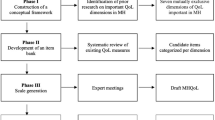Abstract
General percelved health might be considered as a trait measure of perceived health and has been shown to be a reliable predictor of mortality. Current perceived health might be thought of as a state measure and as such should be more sensitive to short-term changes in health status. This paper describes the development of an instrument, the CPH-42 which measures current perceived health among Chinese people. Over 1000 items associated with ill-health were collected after inter-viewing 90 subjects from out-patient and in-patient settings. To these were added 38 items from section 1 of the Nottingham Health Profile (NHP) and the Chinese Health Questionnaire (CHQ30), measures of functional status and mental health respectively. These items were administered to four groups of subjects and 42 items were extracted using discriminant analysis to create the CPH-42. Results show low levels of conceptual overlap between the CHQ30 and CPH-42, and slightly more overlap between the NHP and CPH-42. Subjects' health care utilization behaviour was linearly related to rated current perceived health. It is concluded that the instrument is both a valid and reliable tool (Guttman's split-half coefficient r=0.85) which measures a distinct area of subjective health and is shown to predict health services utilization behaviour significantly better than general perceived health.
Similar content being viewed by others
References
Mossey JM, Shapiro E. Self-rated health: a predictor of mortality among the elderly.Am J Public Health 1982;72: 800–808.
Kaplan GA, Camacho T. Perceived health and mortality a nine year follow-up of the Human Population Laboratory Cohort.Am J Epidemiol 1983;117: 292–304.
Idler EL, Kasl SV, Lemke JH. Self-evaluated health and mortality among the elderly in New Haven, Connecticut, Iowa and Washington.Am J Epidemiol 1990;131: 91–103.
Idler EL, Angel RJ. Self-rated health and mortality in the NHANES-I epidemiologic follow-up study.Am J Public Health 1990;80: 446–452.
Mechanic D. Effects of psychological distress on perceptions of physical health and use of medical and psychiatric facilities.J Hum Stress 1978;4: 26–32.
Mechanic D, Hansell S. Adolescent competence, psychological well-being and self-assessed physical health.J Health Soc Behav 1987;28: 364–374.
Tessler R, Mechanic D. Psychological distress and perceived health status.J Health Soc Behav 1978;19: 254–262.
Barsky AJ, Cleary PD, Klerman GL. Determinants of perceived health status of medical outpatients.Soc Sci Med 1992;34: 1147–1154.
Hunt S, McEwen J. The development of a subjective health indicator.Sociol Health Illness 1980;2: 231–246.
Hunt SM, McKenna SP, McEwen J, Backett EM, Williams J, Papp EA. A quantitative approach to perceived health status: a validation study.J Epidemiol Commun Health 1980;34: 281–286.
Hunt SM, McEwen J, McKenna SP. Measuring health status: a new tool for clinicians and epidemiologists.J R Coll Gen Pract 1985;35: 185.
Jenkinson C. Why are we weighting? A critical examination of the use of item weights in a health status measure.Soc Sci Med 1991;32: 1413–1416.
Meleis AI, Lipson JG, Paul SM. Ethnicity and health among five Middle Eastern immigrant groups.Nurs Res 1992;41: 98–103.
Mitchell RA, Imperial E, Zhou D, et al. A cross-cultural assessment of perceived health problems in the elderly.Disabil Rehabil 1992;14: 133–135.
Guyatt GH, Deyo RA, Charlson M, Levine MN, Mitchell A. Responsiveness and validity in health status measurement: a clarification.J Clin Epidemiol 1989;42: 403–408.
Fielding R, Wong DKN, Ong SG. Symptoms, blood-pressure information and mood effects on symptom recall.Psychol Health 1992;7: 323–330.
Fielding R. Cognition in perceived health (in preparation).
Chong MY, Wilkinson G. Validation of 30- and 12-item versions of the Chinese Health Questionnaire (CHQ) in patients admitted for general health screening.Psychol Med 1989;19: 495–505.
Hyland ME. A reformulation of quality of life for medical science.Qual Life Res 1992;1: 267–272.
Fielding R. Depression and acute myocardial infarction: A review and reinterpretation.Soc Sci Med 1991;32: 1017–1027.
Colantonio A, Kasl SV, Ostfeld AM. Depressive symptoms and other psychosocial factors as predictors of stroke in the elderly.Am J Epidemiol 1992;136: 884–894.
Weisse CS. Depression and immunocompetence: a review of the literature.Psych Bull 1992;111: 475–489.
Author information
Authors and Affiliations
Rights and permissions
About this article
Cite this article
Li, J., Fielding, R. The measurement of current perceived health among Chinese people in Guangzhou and Hong Kong, southern China. Qual Life Res 4, 271–278 (1995). https://doi.org/10.1007/BF02260866
Received:
Accepted:
Issue Date:
DOI: https://doi.org/10.1007/BF02260866




